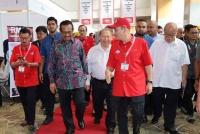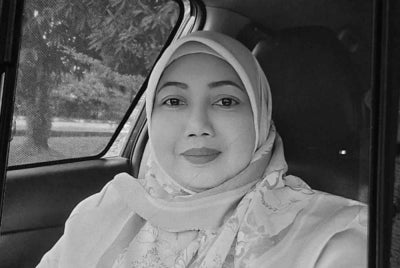Will Sabah's political turmoil force early dissolution of state assembly?
MOHD FAIZUL HAIKA MAT KHAZI
SHAH ALAM - The ongoing political turmoil in Sabah can put pressure on Chief Minister Datuk Seri Hajiji Noor to dissolve the state legislative assembly early, thereby seeing a state election be held after the Hari Raya Aidilfitri celebration later.
Universiti Malaysia Sabah (UMS) senior lecturer Associate Professor Dr Romzi Ationg said even though there were many rumours, there were no signs of a political turmoil at the moment which will cause the fall of the government led by Gabungan Rakyat Sabah (GRS) soon.
Romzi said although there were attempts to topple the state government led by Sabah Umno Liaison Committee chairman Datuk Seri Bung Moktar Radin and Parti Warisan president Datuk Seri Mohd Shafie Apdal, the political turmoil in the 'land below the wind' state was not expected to stop there.
"There were often turbulences in the political situation in Sabah after the 16th state election in 2020 and it is expected to continue.
"Based on that factor, majority of Sabahans ask all political leaders, both the government and the opposition, to continue to reflect and be prudent when making any statements.
"This is because any action that triggers political unrest will harm all parties," he told Sinar Premium, yesterday.
The term of administration of the Sabah state government was currently scheduled to end in September 2025.
However, speculations were now rife that the state's legislative assembly may be dissolved early to make way for the 17th Sabah state election.
Commenting further, Romzi assumed the possibility of Umno joining forces with Warisan to topple the GRS coalition and other local parties in the next state election.
He said if Umno and Warisan joined forces in the 17th state election, questions would rise as to who will be the new Sabah Chief Minister if the Umno-Warisan coalition won in the state election.
"This is because both Bung Mokhtar and Shafie, who were former chief ministers themselves were each interested in leading the number one hot seat in Sabah.
"Thus, there is a fear that there will be a conflict between Umno and Warisan for the Chief Minister post if the matter is not negotiated early," he said.
Meanwhile, National Professors Council senior fellow Datuk Dr Jeniri Amir viewed Sabah's political turmoil as just 'stirring water in a cup' and will not affect the integrity of the state government or Hajiji's position as Chief Minister.
He also hoped that Hajiji would not succumb to pressure from Umno-Warisan since he had the support of Prime Minister Datuk Seri Anwar Ibrahim and the unity government.
In fact, Umno president and Deputy Prime Minister Datuk Seri Ahmad Zahid Hamidi had openly insisted that the crisis involved should be resolved amicably.
"I think the political turmoil in Sabah will not cause the state assembly to dissolve early. The Sabah political turmoil is not of any magnitude because Hajiji still has the support of the majority of the state assembly members and the federal government led by the Prime Minister in Putrajaya.
"I am worried that the people of Sabah will refuse to go out to vote if the Sabah state election is held earlier. This is because they are fed up with the state's power struggle drama.
"The best way now is for all parties to try to stabilise politics and focus on the socio-economic development of the state until the Sabah state assembly dissolves itself next year," he said.
Jeniri said efforts to stabilise Sabah's politics were crucial to remove the stigma among foreign investors who saw the state as the least politically stable state in Malaysia.
"Do Sabah's political leaders want to continue to affect the reputation of the state or do they both try to change the face of Sabah to be seen as a stable state, to be the focus of driving economic development and able to create more job opportunities for the people?.
"Therefore, I hope that all parties should continue to give Hajiji the opportunity to lead Sabah, to prioritise the interests of the people of the state over personal political interests," he said.
Download Sinar Daily application.Click Here!














